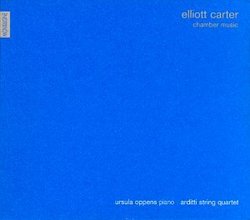| All Artists: Elliott Carter, Arditti String Quartet, Ursula Oppens Title: Carter: Chamber Music (5th String Quartet, 90+, Sonata for Cello and Piano, Figment for Cello Alone, Duo for Violin and Piano, Fragment for String Quartet) Members Wishing: 1 Total Copies: 0 Label: Disques Montaigne Release Date: 9/12/2000 Album Type: Import Genre: Classical Styles: Chamber Music, Historical Periods, Classical (c.1770-1830), Instruments, Strings Number of Discs: 1 SwapaCD Credits: 1 UPCs: 3298497821223, 713746169220 |
Search - Elliott Carter, Arditti String Quartet, Ursula Oppens :: Carter: Chamber Music (5th String Quartet, 90+, Sonata for Cello and Piano, Figment for Cello Alone, Duo for Violin and Piano, Fragment for String Quartet)
CD Details |
CD ReviewsCarter's Fifth String Quartet, plus 5 R. Hutchinson | a world ruled by fossil fuels and fossil minds | 04/27/2002 (5 out of 5 stars) "This is a magnificent set of chamber music from Elliot Carter, featuring the premier recording of his 5th String Quartet by the Arditti Quartet. It was composed in 1994-5, and Carter was there for the 1996 recording in London. If you enjoy Carter's first 4 quartets (recorded by both the Arditti and Juilliard Quartets), you can't miss this! The structure is a 6-part suite, interrupted by chaotic-sounding interludes. Also included are a solo piano piece with Ursula Oppens ("90+"), a solo cello piece with Rohan de Saram of the AQ, duos for cello and piano, and violin and piano (de Saram and Arditti, respectively, with Oppens), and the '94 "Fragment for String Quartet." The oldest of these compositions is from 1948, another is from 1973, and the others are from the 1990s. Some of the finest of modern and contemporary music, both Carter's compositions and the performances by Oppens and the Arditti players!" Delightful chamber pieces mainly from the '90s, when Carter Christopher Culver | 08/04/2008 (5 out of 5 stars) "It's a real shame that this 2001 Naive disc, a reissue of an 1998 Montaigne recording, passed almost immediately out of print and now goes for high prices. Here were have some of Elliott Carter's best pieces for strings and piano, including the world premiere recording of his fifth string quartet. The performers have closely worked with Carter--Ursula Oppens is one of the composer's favourite pianists and the Ardittis are the dedicatee of the fifth string quartet--and this whole recording has an air of definitiveness about it.
The highlight of the disc is the world premiere recording of the String Quartet No. 5 (1994-95). A 20-minute work split into twelve moments, its even-numbered movements alternate with odd-number interludes of an informal character (but which remain precisely notated). The interludes consist of material from the even-numbered movements, and are meant to sound as if each instrumentalist were practising the challenging music that forms the quartet's main. I think that the particular challenge of the string quartet is writing a work where the listener will not notice the monochrome of the timbres, and I don't think Carter's earlier quartets really meet this. On the Fifth, however, the range of sounds feels fuller, with the four instruments sharply delineated. I like this quartet, and listen to it fairly often. "90+" for piano (1994) was written as a 90th birthday greeting for Goffredo Petrassi. It begins as a slow count of 90 beats, around which there are chords and little keyboard runs. This may be the most technically transparent piece of the composer's maturity, and it has proven surprisingly popular among a contemporary music demographic that might not usually go for Carter's music. This disc then takes us all the way back to 1948 with the Sonata for Cello and Piano. This is one of the earliest pieces to feature tempo modulation, and has been seen by many as the dawn of his mature work. Though the rhythms are a bit spicy, the selection of pitches seems to me much more in line with Carter's neoclassical beginnings than his mature modernist period. "Duo" for violin and piano (1973) opens with the violinist playing long, wrenched lines while the pianist just throws in a note here and there. Eventually the piano opens a full dialogue in almost dance-like tones. This and the following "Figment" for solo cello (1994), where Rohan de Saram effortlessly pulls a world of sound out of his solo instrument, strikingly show just how lyrical Carter can be in spite of his complex modernist language. "Fragment" for string quartet (1994) is one of the most unusual pieces in Carter's output. The composer's distinctive style has generally been busy music with lots of little details, but this four-minute piece is a soundscape of slowly moving harmonics. If you didn't know it was a Carter piece, you'd certainly never guess. As the disc passes over the 1950s and 1960s, when Carter's music was at its most abrasive, this may be the best introduction to Carter's music for those who like little chamber works. Too bad it's now difficult to find. With the celebrations of the composer's 100th birthday this year, let's hope a reissue is on the way." |


 Track Listings (20) - Disc #1
Track Listings (20) - Disc #1